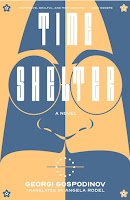Book Review: Time Shelter by Georgi Gospodinov
My Rating:
4.5⭐
In Georgi Gospodinov's Time Shelter, our narrator (a Bulgarian novelist) takes us through his association with Augustine-Garibaldi (“And so early theology and late revolutionism were brought together.”) or Gaustine as we get to know him. Gaustine is a geriatric psychiatrist who uses his knowledge to treat those suffering from Dementia or Alzheimer’s by creating a safe space for them – a space and time defined by their state of mind, a time they associate with happiness. His “clinic of the past” features rooms that are meticulously designed, each representative of a decade in history. Our narrator assists him in acquiring objects and memorabilia that are to be used in setting up the said facilities- from wall calendars and posters to typewriters and radios to cigarettes and chocolates – no holds barred in recreating a figment of the past that corresponds to the patients' memories- a “protected past”.
“The time is coming when more and more people will want to hide in the cave of the past, to turn back. And not for happy reasons, by the way. We need to be ready with the bomb shelter of the past. Call it the time shelter, if you will.”
As the clinic in Zurich expands and new decades are introduced into the framework, Gaustine correctly assumes an approaching era when people, in an attempt to escape their present lives, would voluntarily choose to go back to a time and place when they felt more content or safe. This starts with Gaustine allowing family members and friends to accompany the patients to make them feel at home and provide them with insight into details of their lives – an example we see with a patient who was once surveilled by the Socialist State being visited by the very same government agent who was assigned to follow him decades ago and report his actions- to fill in the gaps in his memories. (“If we are not in someone else’s memory, do we even exist at all?”) Gradually the desire to postpone the future spreads and the lines between past and present start to blur and recycled pasts/secondhand futures become the call of the day with European nations opting to “vote for the past” and revert to a glorious phase in their history, recycling the past into the future rather than advancing into a future that does not hold much promise - but not without consequences. (“The world had become a chaotic open-air clinic of the past, as if the walls had fallen away.”)
The author discusses the past and present politics of the Eastern European nations and the EU through significant historical landmarks which are explored in the process of creating a time map for the countries of the union- the shared past, the distinct present and the point of reset when the timelines would eventually merge, if at all. As the situation worsens,with nations descending into chaos and anarchy, Gaustine disappears and the narrator’s own memories seem to start collapsing into one another.(“While writing a novel about those who have lost their memories, he himself begins to lose his memory . . . He rushes to finish it before he forgets what he was writing.”) The reader (and the narrator) is compelled to question whether Gaustine is a real person who actually exists or a figment of the narrator’s imagination. “Gaustine, whom I first invented,and then met him in flesh and blood. Or perhaps it was the opposite, I don’t remember.”
The novel is divided into five segments and revolves around the themes of losing, escaping, controlling and halting time and the consequences of choosing to live in the past rather than looking ahead and moving forward. Initially, the tone is that of dry humor and nostalgia but gradually the setting and the tone transform into dystopian and critical. The pace of the novel is slow yet absorbing. The book does require a bit of patience. I did have to look up quite a bit on the Eastern European history referenced in the narrative, but it was well worth the effort. Complex yet brilliant, at times reflective, terrifying and hard-hitting, Georgi Gospodinov's "Time Shelter" is literary fiction in its finest form. Fans of Camus, Dostoevsky and Kafka will surely enjoy Gospodinov's work.
“Does the past disintegrate, or does it remain practically unchanged like plastic bags, slowly and deeply poisoning everything around itself? Shouldn’t there be factories for recycling the past somewhere? Can you make anything else out of past besides past?”
Thanks to NetGalley and W.W.Norton & Company for the digital review copy in exchange for an honest and unbiased review.

Comments
Post a Comment